Family

In May, Surgeon General Dr. Vivek Murthy declared social isolation to be a U.S. public health crisis for its link to depression in youth and increased risks for many health conditions in older Americans.

AT THE CLOSE of the music video for “$20,” all three bandmates of boygenius — the young indie band turned chart-topping supergroup — cut their palms and swear a blood oath to each other. As I watched it for the first time, I couldn’t help but feel drawn toward prayer — is this what love looks like? It is subversive to hold on to the tenderness of friendships in a world rife with violence. But boygenius, consisting of Julien Baker, Phoebe Bridgers, and Lucy Dacus, refuses to do anything less in their debut full-length album the record — a searing homage to their love for each other. It is nothing short of divine.
Ringing with angst and affection, these songs meld post-grunge guitar riffs with heartfelt existential threads. In “Satanist,” they respond to ruminations in Ecclesiastes 1:2, “Everything is meaningless,” by singing, “If nothing can be known, then stupidity is holy.” By embracing the finitude and vapor of our existence, they, like the Teacher in Ecclesiastes, “[make] peace with [their] inevitable death” (from the song “Anti-Curse”).
Yet, amid all the nihilism, there’s joy. Boygenius’ gushing piano ballad “Letter to an Old Poet” nods to Rainer Maria Rilke’s Letters to a Young Poet, in which the Austrian writer and mystic offers this instruction: “Believe in a love that is being stored up for you like an inheritance.” Boygenius finds this love in friendship.

It would appear that most people raised in the church do not, in fact, stay in the church.
In recent years, there’s been an uncomfortable shift in how the topics of marriage and families are being framed. Rather than simply acknowledging marriage and family as moral goods, children and families are frequently put forward as the solution for preserving Christianity amidst its perceived cultural decline.

EVANGELICALS AND OTHER Christians involved in adoption and “orphan care” ministries have often evoked Paul’s use of adoption as a metaphor: God “adopts” us into the family of God, so we should adopt children as a manifestation of the gospel.
But New Testament scholar Erin Heim, a U.S. domestic adoptee herself, has raised questions about Pauline adoption metaphors. “The thing that always gets said — ‘contemporary adoption is a horizontal expression of God’s vertical adoption of us’ — there’s something at face value that is a little bit comforting about it, but that doesn’t sit very well for very long,” Heim said in a podcast about her research on these metaphors.
Adoption by nature is a vertical relationship, Heim explained, referring to power inequities between parents and children and between cultures. “There’s no such thing as horizontal adoption,” she said. “When we make mini vertical things that [try to] look like what God does in the Bible, it’s idolatry.”
Christians were pioneers in the establishment of international adoption to the United States in the 1950s and later spurred an orphan care movement during the peak of international adoption in the early 2000s. Since 1948, roughly 1 million children globally have been placed in new families, far from their original families and culture, through intercountry adoption, according to demographer Peter Selman — more than 380,000 of them between 2000 and 2009.
While faith has guided Christians in promoting adoption, religious narratives also have upheld harmful power structures and practices. “White saviorism” and racial hierarchies have led to the separation of children from their cultures of origin. Adoptees who are now adults have shared stories of struggle within families and societies that deny or misunderstand these dynamics.
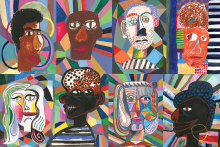
FOR MANY OF US, the approaching holiday season brings a mix of excitement and dread. We look forward to gathering with loved ones we haven’t seen for a while. But these gatherings come with land mines of casually dropped remarks that belie our togetherness. They reveal deep chasms between our understandings of what is good for ourselves, this country, and the world.
Do we respond when a family member says something offensive? Do we ignore them? Do we try to engage, even if past attempts have proven fruitless?
My own attempts to engage with family who have different political views and interpretations of scripture have come to an impasse in the past year. I’ve felt wounded and disappointed and am lowering my expectations for these relationships. But the Spirit is also nudging me to keep my heart open a crack.

The Parkers wanted to limit small talk at their annual family Christmas party, fearful that conversation would veer into politics, or religion, or whether Pete Davidson is unconventionally attractive. So they organized a harmless white elephant gift exchange. By night’s end, they would be full of carbs and regret, vowing to play charades next year.
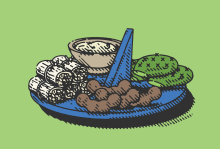
“HAY MÁS TIEMPO que vida” was my dad’s refrain every time I was stressed and weary. “There is more time than life.” His simple words had profound implications.
Being present to life is difficult. Life demands that we “rise and grind.” Reward comes to those who make the most of the time they’ve been given. Time is money. Time is a commodity we trade. The promise of life is the goal of all this grinding—or retirement, if we are privileged.
During the pandemic, I’ve pushed against beliefs that commodify time. I’ve cooked the foods that nourished my ancestors: tamales verdes, atole de tamarindo, and nopalitos. My senses have been awakened through mixing the nixtamalized corn flour with water and fat until it reached the right texture, peeling and deseeding each tamarind pod, cutting the nopal (cactus) and cooking it with a few tomatillo husks to remove the slime.
The preparation of these foods forces me to notice the rough spots on the cacti where thorns still make their home, to smell the acid scent of tamarind in the pulp clinging to my fingers; it invites me to play with the unruly dough that believes its place is on top of the corn husk and not inside. If death shows up in separation, life sprouts in connection.

THE FIRST STAGES of parenting are sometimes called “the longest shortest time,” as an award-winning podcast on parenting attests. For a newborn and a new parent, the days are dense. Everything matters.
In the United States, many families’ caregiving-rich days of new parenthood are curtailed by work. A fifth of new mothers return to work within days or weeks of having a child, often driven by financial precarity. More than half of parents surveyed who were able to take some parental leave from work said they took less time off than they needed or wanted, the majority citing fear of lost income or jobs. As one mother, a call center employee with a newborn, said in an interview for a 2018 Center for Public Justice report, “My work doesn’t pay for maternity leave ... If I don’t go back to work in two weeks, we will not have enough money to pay our electric bill.”
From the biblical account of creation through the prophets’ visions of shalom, Christian tradition presents family life as fundamental to human life and society. Essayist Wendell Berry reasoned that a good human economy is one that “proposes to endure.” The nurture of children and care for loved ones, of course, is one way our society endures.

I don’t live with the illusion that the holidays are cheery for everyone. Many of us find ourselves interacting with family and friends who do not have the same values we do. Here are four tips for navigating difficult relationships over the holidays — without compromising on dignity.

Misinformation is widespread, and it can be dangerous. And while correcting misinformation can feel urgent, a team of experts told Sojourners that challenging our loved ones’ beliefs is a difficult and time-intensive undertaking. This is because misinformation about politics, religion, and health often ties into our deepest beliefs about ourselves: Challenging them isn’t just correcting facts, it’s resetting an entire worldview.

IN THE NOVEL Transcendent Kingdom, Gifty is a doctoral candidate in neuroscience at Stanford University, aiming to identify the neural pathways that suppress reward-seeking behavior. She is at the lab trying to keep two mice from tearing each other apart when her mother’s pastor calls. Gifty’s mother is sick, severely depressed ever since her son, Gifty’s brother Nana, died of a heroin overdose. Now, years later, Gifty wants nothing more than to bring her mother back to life.
In her second book, author Yaa Gyasi continues to grapple with familial loss and inheritance. But while her debut novel Homegoing examined the legacy of slavery, Transcendent Kingdom follows a young woman as she recalls her immigrant family’s triumphs alongside their devastating fight with depression and addiction. Through her methodical (scientific, spiritual, and philosophical) inquiry, Gifty tries to keep their memories alive.
What happens when the past haunts and overwhelms the present? At 28, Gifty’s life is lonely lab work and rumination, a mother unresponsive save for her hum, a father so distant he is not called by name. Even when Gifty is silent, the past reverberates loudly in her relationships. If she can find answers to her research questions, perhaps one day someone could be saved from the throes of addiction. But who will save her?

In Paul’s letter to the church at Rome, he writes, “And we know that in all things God works for the good of those who love him” (Romans 8:28). This passage can easily be misconstrued to mean that adversity and hardship are ordained by God. A more faithful interpretation is that God can generate good out of even terrible circumstances. In light of this eternal truth, throughout this troubling year I have found hope and resilience by discovering silver linings in the midst of uncertainty and anguish.
One of the most important blessings has been extra, uninterrupted time with my family. A frenetic travel schedule in the spring came to a screeching halt in March, and I haven’t been on a plane since. My daily two-hour commute to my kids’ school and to work also vanished. I have tried to pour much of this precious gift into my family, particularly as my two young sons adjusted to the new COVID reality, including virtual classes that tested all our sanity. Our family spent the early months of the pandemic playing many games together and watching every Marvel movie made and our favorite kid-appropriate sports movies, from Remember the Titans to Miracle to 42.

I worry my children will be stunted by the solitary nature of our lives. Like how a tree during a hard season slows its growth, a ring for a year of strain nothing more than a thin encasement, the depth of skin. We’ve spent months in isolation, only briefly in the midst of others, but never close enough to touch.

Amid the reality of racism, resistance, and restraint, I witnessed my grandfather commit his life to bettering the place he’s always known as home. The servant leadership of my paternal grandparents highlights my family’s legacy in South Carolina.
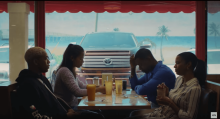
Every moment feels true to life, and the literal waves — the peaks of emotion and the sinking tragedies — carry viewers up and down, a rhythm as unpredictable as it as captivating. WAVES is a film for 2019, that does not shy away from the music and actions of teenagers living in 2019.

Julián Castro recently announced policy to end state-sponsored discrimination against LGBTQ families.

This past February, as we have done for years, my daughters and I loaded a crockpot of taco meat, all the fixings, serving utensils, and dessert into the trunk of my SUV. My two busy teens claimed they had too much homework to stay long, so they drove a different car to the nearby town where we’d eat with homeless families.

A Wrinkle in Time is bright and colorful, not only applying broad imagination to its settings and costumes, but also daring to extend that same concept to its diverse cast. In addition to the multiracial identities of the three Mrs., Meg is biracial and the adopted Charles Wallace is asian. These choices clearly come from a very personal place for DuVernay, and it’s lovely to see that diversity communicated with earnestness and intention. A large part of the film’s message is self awareness and self-love and it’s important that this message comes to audiences through the experience of a young girl of color, addressing universal pre-teen feelings of awkwardness or self esteem issues through a character who relates to more than just a white audience.
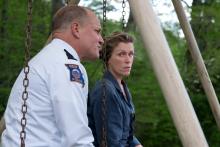
Mildred rents the three billboards down the road from her house to cover with messages shaming the local police chief, Willoughby (Woody Harrelson) in hopes of galvanizing the department into action. She merely irritates the sympathetic Willoughby, but infuriates Dixon (Sam Rockwell), a dim officer with racist and homophobic tendencies and an anger management problem. As tensions escalate and anger begets violence (which begets more violence), Mildred and Dixon are each forced to address the deeper issues inside them that fuel their actions.
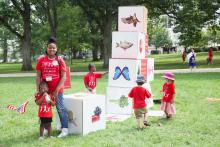
Help them understand they have a voice.
Elizabeth Brandt, a mom and a participant of the play-in, takes her young daughters to her senators’ office. She believes she believes this will lay a foundation for her daughter to speak up throughout her life.
“She may not have the most articulate things to say — last year when she was three she asked them not to throw trash in the ocean which our senators don’t do — but she’s learning that she has a voice in this process and that’s about the most important thing,” said Brandt.